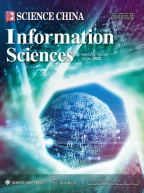Abstract
This paper solves the rotating consensus problem for a group of double-integrator agents with event-based communication only. We propose a distributed event-based rotating consensus protocol, which guarantees that a consensus regarding both position and velocity is achieved when all agents exhibit circular motion around the same center. It is observed that overall less communication is required as the communication between agents is only needed at event times. Moreover, with the proposed event-based protocol, it is proved that Zeno behavior can be strictly avoided for each agent. Numerical simulations show that this event-based control law can efficiently solve the rotating consensus problem.
Similar content being viewed by others
References
Olfati-Saber R, Murray R M. Consensus problems in networks of agents with switching topology and time-delays. IEEE Trans Automat Contr, 2004, 49: 1520–1533
Ren W, Beard R W. Consensus algorithms for double-integrator dynamics. In: Distributed Consensus in Multi-vehicle Cooperative Control: Theory and Applications. Berlin: Springer, 2008. 77–104
Lin Z Y, Broucke M, Francis B. Local control strategies for groups of mobile autonomous agents. IEEE Trans Automat Contr, 2004, 49: 622–629
Lin Z Y, Francis B, Maggiore M. Necessary and sufficient graphical conditions for formation control of unicycles. IEEE Trans Automat Contr, 2005, 50: 121–127
Chen Z Y, Zhang H-T. A minimal control multiagent for collision avoidance and velocity alignment. IEEE Trans Cybern, 2017, 47: 2185–2192
Olfati-Saber R. Flocking for multi-agent dynamic systems: algorithms and theory. IEEE Trans Automat Contr, 2006, 51: 401–420
Ren W, Atkins E. Distributed multi-vehicle coordinated controlvia local information exchange. Int J Robust Nonlin Control, 2007, 17: 1002–1033
Chen Z Y, Zhang H-T. No-beacon collective circular motion of jointly connected multi-agents. Automatica, 2011, 47: 1929–1937
Guo J, Yan G F, Lin Z Y. Local control strategy for moving-target-enclosing under dynamically changing network topology. Syst Control Lett, 2010, 59: 654–661
Lin P, Jia Y M. Distributed rotating formation control of multi-agent systems. Syst Control Lett, 2010, 59: 587–595
Tabuada P. Event-triggered real-time scheduling of stabilizing control tasks. IEEE Trans Automat Contr, 2007, 52: 1680–1685
Hu W F, Liu L, Feng G. Event-triggered cooperative output regulation of linear multi-agent systems under jointly connected topologies. IEEE Trans Automat Contr, 2019, 64: 1317–1322
Dimarogonas D V, Frazzoli E, Johansson K H. Distributed event-triggered control for multi-agent systems. IEEE Trans Automat Contr, 2012, 57: 1291–1297
Seyboth G S, Dimarogonas D V, Johansson K H. Event-based broadcasting for multi-agent average consensus. Automatica, 2013, 49: 245–252
Hu W F, Liu L, Feng G. Consensus of linear multi-agent systems by distributed event-triggered strategy. IEEE Trans Cybern, 2016, 46: 148–157
Cheng B, Li Z K. Fully distributed event-triggered protocols for linear multiagent networks. IEEE Trans Automat Contr, 2019, 64: 1655–1662
Cheng B, Li Z K. Coordinated tracking control with asynchronous edge-based event-triggered communications. IEEE Trans Automat Contr, 2019, 64: 4321–4328
Hu W F, Yang C H, Huang T W, et al. A distributed dynamic event-triggered control approach to consensus of linear multiagent systems with directed networks. IEEE Trans Cybern, 2019. doi: https://doi.org/10.1109/TCYB.2018.2868778
Wang A J, Dong T, Liao X F. Event-triggered synchronization strategy for complex dynamical networks with the Markovian switching topologies. Neural Netw, 2016, 74: 52–57
Duan G P, Xiao F, Wang L. Hybrid event- and time-triggered control for double-integrator heterogeneous networks. Sci China Inf Sci, 2019, 62: 022203
Lin Z L. Control design in the presence of actuator saturation: from individual systems to multi-agent systems. Sci China Inf Sci, 2019, 62: 026201
Zhu W, Jiang Z-P, Feng G. Event-based consensus of multi-agent systems with general linear models. Automatica, 2014, 50: 552–558
Zhu W, Jiang Z-P. Event-based leader-following consensus of multi-agent systems with input time delay. IEEE Trans Automat Contr, 2015, 60: 1362–1367
Godsil C, Royle G F. Algebraic Graph Theory. New York: Springer Science & Business Media, 2001. 207
Acknowledgements
This work was supported in part by National Natural Science Foundation of China (Grant Nos. 61803392, 61790572, 618909302), China Postdoctoral Science Foundation in Central South University (Grant Nos. 2018M630912, 2019T120714), and Hunan Provincial Natural Science Foundation (Grant No. 2018JJ3685).
Author information
Authors and Affiliations
Corresponding author
Rights and permissions
About this article
Cite this article
Ding, R., Hu, W. & Yang, Y. Rotating consensus control of double-integrator multi-agent systems with event-based communication. Sci. China Inf. Sci. 63, 150203 (2020). https://doi.org/10.1007/s11432-019-2692-9
Received:
Revised:
Accepted:
Published:
DOI: https://doi.org/10.1007/s11432-019-2692-9
